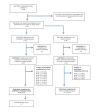Feasibility and Outcomes of an Internet-Based Mindfulness Training Program: A Pilot Randomized Controlled Trial
- PMID: 27450466
- PMCID: PMC4975795
- DOI: 10.2196/mental.5457
Feasibility and Outcomes of an Internet-Based Mindfulness Training Program: A Pilot Randomized Controlled Trial
Abstract
Background: Interventions based on meditation and mindfulness techniques have been shown to reduce stress and increase psychological well-being in a wide variety of populations. Self-administrated Internet-based mindfulness training programs have the potential to be a convenient, cost-effective, easily disseminated, and accessible alternative to group-based programs.
Objective: This randomized controlled pilot trial with 90 university students in Stockholm, Sweden, explored the feasibility, usability, acceptability, and outcomes of an 8-week Internet-based mindfulness training program.
Methods: Participants were randomly assigned to either an intervention (n=46) or an active control condition (n=44). Intervention participants were invited to an Internet-based 8-week mindfulness program, and control participants were invited to an Internet-based 4-week expressive writing program. The programs were automated apart from weekly reminders via email. Main outcomes in pre- and postassessments were psychological well-being and depression symptoms. To assess the participant's experiences, those completing the full programs were asked to fill out an assessment questionnaire and 8 of the participants were interviewed using a semistructured interview guide. Descriptive and inferential statistics, as well as content analysis, were performed.
Results: In the mindfulness program, 28 out of 46 students (60%) completed the first week and 18 out of 46 (39%) completed the full program. In the expressive writing program, 35 out of 44 students (80%) completed the first week and 31 out of 44 (70%) completed the full program. There was no statistically significantly stronger intervention effect for the mindfulness intervention compared to the active control intervention. Those completing the mindfulness group reported high satisfaction with the program. Most of those interviewed were satisfied with the layout and technique and with the support provided by the study coordinators. More frequent contact with study coordinators was suggested as a way to improve program adherence and completion. Most participants considered the program to be meaningful and helpful but also challenging. The flexibility in performing the exercises at a suitable time and place was appreciated. A major difficulty was, however, finding enough time to practice.
Conclusions: The program was usable, acceptable, and showed potential for increasing psychological well-being for those completing it. However, additional modification of the program might be needed to increase retention and compliance.
Clinicaltrial: ClinicalTrials.gov NCT02062762; https://clinicaltrials.gov/ct2/show/NCT0206276 (Archived by WebCite at http://www.webcitation.org/6j9I5SGJ4).
Keywords: Internet; Internet-based intervention; acceptability; feasibility; mindfulness; randomized controlled trial; usability.
Conflict of interest statement
Conflicts of Interest: None declared.
Figures
Similar articles
-
Internet Mindfulness Meditation Intervention for the General Public: Pilot Randomized Controlled Trial.JMIR Ment Health. 2016 Aug 8;3(3):e37. doi: 10.2196/mental.5900. JMIR Ment Health. 2016. PMID: 27502759 Free PMC article.
-
The Efficacy of Internet-Based Mindfulness Training and Cognitive-Behavioral Training With Telephone Support in the Enhancement of Mental Health Among College Students and Young Working Adults: Randomized Controlled Trial.J Med Internet Res. 2017 Mar 22;19(3):e84. doi: 10.2196/jmir.6737. J Med Internet Res. 2017. PMID: 28330831 Free PMC article. Clinical Trial.
-
Feasibility of an online mindfulness-based program for patients with melanoma: study protocol for a randomised controlled trial.Trials. 2018 Apr 13;19(1):223. doi: 10.1186/s13063-018-2575-x. Trials. 2018. PMID: 29653555 Free PMC article.
-
Digital Characteristics and Dissemination Indicators to Optimize Delivery of Internet-Supported Mindfulness-Based Interventions for People With a Chronic Condition: Systematic Review.JMIR Ment Health. 2018 Aug 21;5(3):e53. doi: 10.2196/mental.9645. JMIR Ment Health. 2018. PMID: 30131317 Free PMC article. Review.
-
Mindfulness to Manage Moral Injury: Rationale and development of a live online 7-week group intervention for veterans with moral injury.Contemp Clin Trials Commun. 2022 Oct 14;30:101011. doi: 10.1016/j.conctc.2022.101011. eCollection 2022 Dec. Contemp Clin Trials Commun. 2022. PMID: 36340697 Free PMC article. Review.
Cited by
-
Digital Mental Health Interventions for Depression, Anxiety, and Enhancement of Psychological Well-Being Among College Students: Systematic Review.J Med Internet Res. 2019 Jul 22;21(7):e12869. doi: 10.2196/12869. J Med Internet Res. 2019. PMID: 31333198 Free PMC article.
-
Supporting Our Valued Adolescents (SOVA), a Social Media Website for Adolescents with Depression and/or Anxiety: Technological Feasibility, Usability, and Acceptability Study.JMIR Ment Health. 2018 Feb 26;5(1):e17. doi: 10.2196/mental.9441. JMIR Ment Health. 2018. PMID: 29483067 Free PMC article.
-
Understanding How Virtual Reality Can Support Mindfulness Practice: Mixed Methods Study.J Med Internet Res. 2020 Mar 18;22(3):e16106. doi: 10.2196/16106. J Med Internet Res. 2020. PMID: 32186519 Free PMC article.
-
StudiCare mindfulness-study protocol of a randomized controlled trial evaluating an internet- and mobile-based intervention for college students with no and "on demand" guidance.Trials. 2020 Nov 26;21(1):975. doi: 10.1186/s13063-020-04868-0. Trials. 2020. PMID: 33243300 Free PMC article.
-
A Guided, Internet-Based Stress Management Intervention for University Students With High Levels of Stress: Feasibility and Acceptability Study.JMIR Form Res. 2023 Nov 10;7:e45725. doi: 10.2196/45725. JMIR Form Res. 2023. PMID: 37948106 Free PMC article.
References
-
- Kabat-Zinn J. Wherever you go, there you are: mindfulness meditation in everyday life. New York: Hyperion; 1994.
-
- Kabat-Zinn J. Mindfulness-based interventions in context: past, present, and future. Clin Psychol Science Practice. 2003;10(2):144–156. doi: 10.1093/clipsy.bpg016. - DOI
-
- Kabat-Zinn J. Full Catastrophe Living : Using the Wisdom of Your Body and Mind to Face Stress, Pain, Illness. New York: Delacorte Press; 1990.
-
- Eberth J, Sedlmeier P. The effects of mindfulness meditation: A meta-analysis. Mindfulness. 2012 May 2;3(3):174–189. doi: 10.1007/s12671-012-0101-x. - DOI
Associated data
LinkOut - more resources
Full Text Sources
Other Literature Sources
Medical


